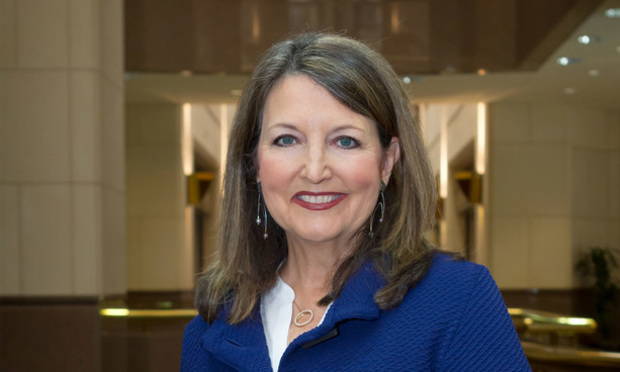 Jerry Clements, Locke Lord
Jerry Clements, Locke Lord
Locke Lord chair Jerry Clements, who has been in charge of the Texas-based firm since 2006 and guided it through two major mergers, will step down from her leadership role on Dec. 31. She will be succeeded by securities partner and Houston office managing partner David Taylor.
The transition of power follows many months of succession planning.
Taylor’s selection as chair of the 721-lawyer firm comes more than a year after Clements notified the firm’s executive committee that she wanted to step down as chair, and 16 months after she presented the committee with a leadership succession plan. The firm’s succession planning had been limited, she said, and she wanted to make sure the process was robust and unifying.
“I wanted to avoid the possibility of a divisive election,” said Clements, who will become chair emeritus of the firm.
 David Taylor
David Taylor
Taylor’s selection as chair came after a leadership succession committee spent several months interviewing every partner in the firm about what they want to see in the next chair. They also interviewed the associates committee, the diversity committee, and some staff before coming up with a short list of potential candidates. Ultimately, they unanimously recommended Taylor to the firm’s executive committee.
“It was a very successful process,” said Robert Miller, the partner who chaired the leadership succession committee. “What we were trying to avoid was a horse race where the losing candidate and their camp felt that somehow they had lost and perhaps felt like they have to go another direction.”
Miller, who joined the firm 32 years ago, said in the past, the firm’s managing partner— the firm changed the title to chair in 2007—would simply pick the new managing partner.
“The old managing partner simply decided who should be the next managing partner and literally walked into their office and said you are it. Good luck,” Miller said.
But Clements, 63, wanted a better succession plan. She decided in early 2016 that she would transition out as chair because she had been in the job a long time and because she wants to spend more time with her four grandchildren, she said.
In preparation for the succession, she read a lot about law firm succession planning. She discovered that in instances of a contested election, the lawyers not selected for the top job often opt to leave the firm in short order. Clements said she didn’t want that to happen, and also wanted everyone in the firm to “buy in” to the new chair.
Clements said the executive committee approved her leadership succession plan, making a few changes to her original draft, and she asked 11 midcareer partners in a wide range of practices to serve on the leadership succession committee with Miller as chair.
The committee met for the first time in December 2016 for an organizational dinner, Miller said. They met the second time in April at the partners’ retreat.
Around that time, the committee members started interviewing every partner in the firm, asking them questions about the qualities they want to see in the next chair of the firm, their priorities for the firm, and suggestions for a new chair. From those interviews, the committee created a short list of six partners.
In late August, the day before Hurricane Harvey was set to strike Texas, the committee met in Dallas and questioned four candidates (two had decided they weren’t interested) and then presented the executive committee with the names of three finalists.
“We went back out to the partnership and said, ‘Here are the finalists and what are your thoughts on these three?’” Miller said.
In October, each of the finalists participated separately in teleconferences where they gave opening remarks and then were questioned by Miller and partners. Taylor and Clements would not identify the other two finalists, but Taylor said both of them will serve the firm in major leadership roles next year. Clements said the finalists included one woman, and one partner from Dallas and one from Chicago, in addition to Taylor.
On Nov. 14, after more discussions with partners, the committee recommended unanimously to the firm’s executive committee that Taylor be named chair. The executive committee gave its unanimous approval and the decision was announced to the partnership. The firm’s partners ratified the selection with a vote.
Clements said she initially planned to step down at the end of 2018 and spend the year training Taylor. But on Dec. 1 she told him that she had decided to step down at the end of this month so she wouldn’t be a lame duck leader.
“He’s ready,” Clements said of Taylor, who is a member of the firm’s executive committee and chair of the firm’s finance committee. He is also currently managing partner of the Houston office and chair of the firm’s capital markets section. He joined the firm in 1988 after graduating from the University of Texas School of Law.
Taylor said Clements’ decision to step down at the end of the month is a “gracious move.” He said she has set a high bar for him because of how well she handled the 2007 merger between Texas-based Locke Liddell & Sapp and Chicago-based Lord, Bissell & Brook, and also the firm’s January 2015 merger with Edwards Wildman Palmer.
As a result of those mergers, Locke Lord moved during Clements’ tenure from the 110th spot on the Am Law 100 list to 60th. The firm, with 20 offices, posted $559 million in revenue in 2016.
Taylor said his initial goals are to make sure the firm is well-respected in each city and has a strong brand. He wants to help the firm build on its strengths, act nimbly, and stay financially strong so it can afford to make investments.
Clements said she’s most proud of Locke Lord’s evolution from a Texas firm to one that’s recognized around the world. She is also proud that she was able to lead the partnership through the mergers, and of the resulting changes they created—even when partners didn’t necessarily think the firm needed to change. Finally, she is proud of the leadership succession plan she developed.
“My biggest success was the mergers, and my biggest challenge was the mergers,” she said.
Beginning in January, she will work on business development, client relationships, transition with Taylor and work with the litigation practice teams, she said.
Clements acknowledged that her departure from the job of chair means that one less woman is leading a large U.S. firm. But she noted that the number of women in that role has increased over the last few years.
“As one of us steps down, two of us are being put in place,” she said.


